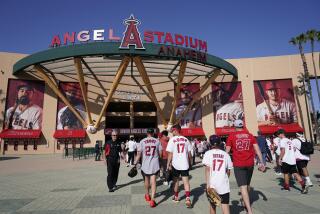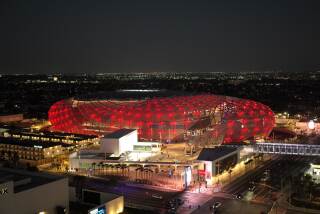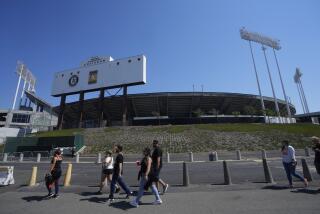Wall of Secrecy Surrounds Key Part of Arena Deal
- Share via
A property development is not a nuclear secret.
So why is it that the city of Los Angeles signed a confidentiality agreement with the developers of the proposed downtown sports arena that prevents public scrutiny of the linchpin of the arena deal--a guarantee that the basketball Lakers and hockey Kings will play there for 25 years. If the teams leave, the arena--to be subsidized by $70 million in city bonds--probably will be a money loser and we taxpayers will be out big bucks.
Last Monday, I first wrote about the secrecy enveloping these contracts--secrecy decreed by a confidentiality agreement between the arena legal team and the city as the City Council prepares for a final vote on the deal.
Since then I haven’t made much progress in penetrating the secrecy. But on Wednesday, I obtained a copy of the confidentiality agreement itself, which had been signed by Ted Fikre, representing the arena developers, and Amy E. Freilich, a private attorney hired by the city for the arena case.
In it, the city promised not to reveal any section of the contract dealing with “operation of the arena, scheduling of events, sharing of revenues, advertising and sponsorship exclusivity, premium seat and club arrangements, complimentary tickets, merchandise and program sales and design and use of team facilities.”
In other words, just about everything is secret.
*
I think such a confidentiality agreement is in direct conflict with the California Public Records Act, which assures residents of access to state and local government records. Courts have found such attempts to bypass the law are illegal.
The law was written for everyone in California, not just the press. As the Public Records Act says, “access to information concerning the conduct of the people’s business is a fundamental and necessary right of every person in this state.”
The law is clear about what is considered a public record: “Any writing containing information relating to the conduct of the public’s business prepared, owned, used or retained by any state or local agency. . . .”
These documents are certainly being used by the city as the council makes its final decisions on the arena deal. But the L.A. Arena Co. and its lawyers have come up with a strategy to thwart the Public Records Act.
The contracts containing the Lakers’ and Kings’ guarantees are kept in the law offices of Latham & Watkins, attorneys for the arena company. They are not in City Hall. They are not in the possession of city officials. Thus, the arena crew maintains they are not public records.
The security surrounding these documents is at national defense levels.
Attorneys for the city--who, coincidentally, represent us taxpayers--are permitted to examine the documents only in the Latham & Watkins offices. They are not allowed to take copies away.
It makes it tough, if not impossible, for the city’s attorneys to practice effective law if they’re denied the normal practice of bringing the documents back to their office and discussing the complicated case with colleagues. A colleague, for example, might suggest that the contracts be run by lawyers who have had experience with similar deals in other cities.
Nor will the contracts will be given to the City Council. Instead, the council will get a summary--just a summary--of the contract sections that ostensibly guarantee that the Lakers and Kings will not leave town for the next 25 years.
As a result, there will be many unanswered questions.
Do other sections of these contracts--paragraphs not summarized for the council--contain escape hatches, permitting the Kings and Lakers to leave town under certain conditions?
Just as important, are there other documents, other contracts between the teams and the arena company that the developers and their attorneys have not shown to the city’s lawyers? If there are such documents, do they contain Laker and King-friendly escape hatches?
*
As the state law says, everyone has a right to know the answers.
So today, I’ll head over to City Hall and deliver to City Clerk J. Michael Carey a written request for the contracts the arena company has with the Lakers and Kings.
Copies will go to the mayor, City Council President John Ferraro and City Atty. Jim Hahn, all of whom share the responsibility for keeping the contracts secret. They have 10 days to reply to the request, made under the Public Records Act.
They shouldn’t have made the confidentiality agreement. I’m in favor of the arena, but such secrecy makes me wonder what’s wrong with the deal.
More to Read
Go beyond the scoreboard
Get the latest on L.A.'s teams in the daily Sports Report newsletter.
You may occasionally receive promotional content from the Los Angeles Times.






